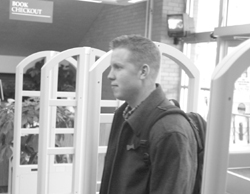|
Library works to minimize losses
by Walter Cooley
COO99031@BYUI.EDU
Scroll Staff
 |
| Matthew Chidester, a freshman from Townsend, Mass., walks through the detectors at the library front doors to study. Chidester is one of thousands of students who must pass through the detectors that help protect the library materials from being stolen. Even with this security system, the library lost 142 reported items last semester. JUSTIN RICH / SCROLL |
|
When pens started disappearing at the circulation desk of the David O. McKay Library last semester, the desk employees added magnetic strips to catch students who tried to leave the library with them.
The strips kept more pens at the circulation desk, but with an increasing number of students using the library, the potential for items disappearing within the library and items leaving the library have increased.
“A lot of lost items aren’t intentional; students just forget,” Martin Raish, library director, said.
The number of students entering the library gates was up 44 percent in 2002. A large factor contributing to the increase is the growth in the student population of BYU-Idaho, according to the library’s records.
“As user population increases, problems increase,” Raish said.
These problems include lost and disappearing items. But Raish said that at any library approximately 5 percent of its items in circulation will disappear.
“Every library in the world struggles with things disappearing. That is the nature of opening things up to the public,” Raish said.
Last semester, the library reported 142 articles lost. A book or library article is considered lost after being overdue six weeks, Linda Jenkins, circulation reserve supervisor, said.
The charge for lost books is a flat rate of $31, Jenkins said.
The most frequently lost book is The Miracle of Forgiveness, Raish said.
The library also reported that 56 items missing at the end of Fall Semester 2002. The library’s computer catalog system lists a total of 668 articles missing. These items disappeared without being checked out, Raish said.
The increased number of students intensified competition for books in certain academic fields. Books turn up missing when students replace the books to the shelve s themselves or hide them to avoid competing with other students, Raish said.
Despite competition, the number of lost and missing books is not as high as might be expected at a university this size, Raish said.
“Lost and missing books are a tiny fraction of a half-million things,” Raish said.
Raish has made changes in the library’s security since appointed library director.
“This summer our new library director really started beefing up security,” Nicole Olivier, a senior from Marquette, Mich., and three-year employee of the library, said.
The library is buying two to three times more books, Raish said. The library’s spending is an attempt to decrease the amount of competition for the library’s materials.
The Honor Code, student’s integrity and the lack of graduate program competition keep library materials more secure, Raish said, adding a complimentary word for BYU-Idaho students.
Even though Raish said he is aware of the need to increase security, library security at BYU-Idaho doesn’t bother him too much, he said.
“I don’t stay up nights worrying about it,” he said.
|